Search
Showing 10 of 1193 results for Value-priced treatments https://simplemedrx.top
-
Around the World in Five
INDIA
New Zealand sees 63 percent rise in first-time visas for Indian students
An industry-oriented curriculum and a focus on a supportive educational experience has triggered an increase in Indian students choosing to study in New Zealand.
NEW ZEALAND
Scholars to study traditional health system in India
A multi-disciplinary team of senior Rongoā Māori scholars, practitioners and members of the community will undertake a six-week indigenous health and entrepreneurship programme in India, supported by the Prime Minister’s Scholarships for Asia.
GLOBAL
The world’s changing language landscape
It’s never been more difficult - or more exciting - to choose which foreign language to study, as such a wide range are now important.
GLOBAL
International students want universities to be greener
Nearly all prospective international students looking to study in the United States, United Kingdom, Australia or Canada believe universities are not doing enough to be environmentally sustainable, according to new research.
ASIA
Asia outperforms continental Europe in top 500 universities for boosting student careers
In contrast to the QS World University Rankings, Asia’s top universities were shown to outperform continental Europe’s leading institutions.
-
Around the world in five
ASIA
APAIE: International education critical for Asia’s diplomacy, ambitions
International education in Asia Pacific has been a critical diplomacy tool for the region – one that is becoming all the more essential given the tempestuous global political landscape. Fostering a global outlook among students and facilitating people-to-people exchange is crucial, and international education can achieve what politicians are unable to, building positive relations between people and even countries, where relations are poor.
JAPAN
Push for foreign students to stay on to work in Japan
It is now a top priority that international students attending Japanese universities stay on in the country, with the government offering new incentives such as subsidised company internships, help with finding jobs on graduation, stepped-up Japanese language courses and more streamlined processes for work visas after graduation.
GERMANY
Germany is 'best country for international students', above UK
When students think about studying in a foreign country, their destination of choice tends to be either the United Kingdom or the United States, but a new study argues that Germany is now the best option for international students in Europe. The study ranked 30 European countries according to education, costs, life and career. Germany came on top with a total score of 83.2 out of 100 – far ahead of the UK, which scored 69.8.
CANADA, AUSTRALIA
Canada, Australia woo international students
Canada and Australia have goals to attract more international students to their universities, with policies that include more relaxed visa procedures, work rules and paths to citizenship. Given the current unsettled political climate in the U.S. and the United Kingdom, Canada and Australia are emerging as attractive education destinations for prospective international students.
CHINA
China sees 11% growth of international student enrolments
The number of international students in China continues to climb, reaching 442,773 last year, and putting it on track to reach its target of hosting half a million international students by 2020. Korea was the top source country, sending just under 16% of all international enrolments. The US, accounting for 5.4% of all students, was the second-highest sending country, followed closely by Thailand.
-
Around the world in five - June 2022
International
‘Value over volume’ heart of NZ international strategy
Education New Zealand marks reopening of borders with new global campaign
Education New Zealand launches new marketing campaign
New Zealand confident of international enrolment’s Covid recovery
Te Pūkenga seeks to drive NZ internationalisation
New Zealand moves to active footing for student recruitment with new national strategy
Investing in skills of future can add $8.3 trillion to global economy: WEF
UCAS report: UK set for HE growth, shows factors in student decisions
Students’ pick for top study abroad destination? Survey says…
New Zealand
Education Minister Chris Hipkins jets abroad to woo international students
Vanessa hones in on her passion
Tertiary institutions ready to welcome back international students
International student market unlikely to recover quickly, agents warn
When will SIT's international student numbers bounce back?
Brazil
New Zealand reopens its borders to exchange students and wants Brazilians
Chile
Ambassador of New Zealand met with rector of the UCN
China
Chinese students more reluctant to study abroad post-COVID
UK Private Schools Face Curbs On China Links In Beijing’s Education Crackdown
India
Indian Kid Among 8 Students Redesigned Graduation Gowns for New Zealand Universities
Indian child among 8 students redesigned graduation gown for New Zealand universities
‘Education quality, cost of living abroad among worries for desi students’
31% teachers in India not proficient in digital tools, 79% still undergoing training: survey
48 foreign universities interested in UGC’s twinning initiative
Latin America
New study reveals COVID’s impact on region’s universities
Thailand
United States
A few observations from the NAFSA conference
Domestic pastoral care learnings in NZ schools
Viet Nam
-
Thank you to NZIEC KI TUA Partners
The conference was attended by 599 delegates and saw 42 sessions delivered over two days by 85 speakers, including expert panellists.
Thanks again to our NZIEC KI TUA 2023 Partners; our Country of Honour: People’s Republic of China, CSCSE, Streamliner, Student Safe, Flywire, idpconnect, IELTS, Southern Cross Travel Insurance, Kiwiflora Nurseries, Yoobee College of Creative Innovation, Orbit Protect, Host Families, Christchurch Foundation and the Tui Corridor Project, University of Canterbury, University of Canterbury International College, Lincoln University and The University of Auckland.
Being the first in-person conference since 2019, connection was more important than ever and our NZIEC KI TUA 2023 exhibition hall was renamed The Experience Garden where delegates could do just that – engage, connect, and experience.
Delegates who visited the team at the Country of Honour’s Chinese Service Center for Scholarly Exchange (CSCSE) table, were able to have their name written in Chinese calligraphy and learn more about studying in China.
Locally made ice cream was provided by Southern Cross Travel Insurance, barista-made coffee from Student Safe and a special tea café was brought to delegates by idpconnect and IELTS.
Delegates also had the opportunity to experience a virtual reality journey with Yoobee College of Creative Innovation.

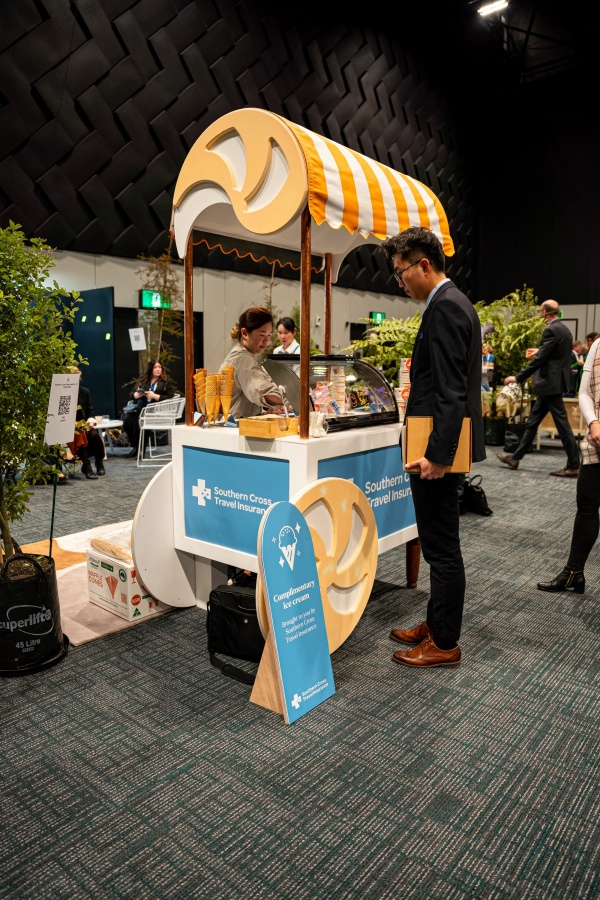
Thanks to the Kiwiflora Nurseries massage relaxation corner, delegates also got a chance to rest with a neck and shoulder massage and relax in their cosy and tranquil waiting area. Kiwiflora Nurseries partnered with NZIEC KI TUA and the Christchurch Foundation and the Tui Corridor Project to help us in our commitment to sustainability; for every delegate registration, a native tree was planted, fostering a greener future for generations to come.
The Host Families photography headshots activation was a hit with over 80 photos taken by the photographer.
The Orbit Protect Better Health Quiz provided delegates with a little downtime and a fun competition as they went head-to-head in earning points for prizes.
And last but not least, much appreciation goes to our partner Flywire as the Education New Zealand Manapou ki ta Ao Tamaki Makaurau Auckland office now has a new piece of artwork based on the theme of ‘How collaboration will shape the future of global education’ for their wall.
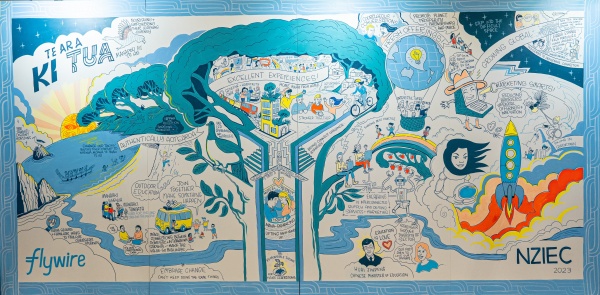
Thanks to all our 2023 partners in making this year’s conference a great one!
Check out the photo highlights reel from NZIEC KI TUA here.
We look forward to having you join us at Tākina in Te Whanganui-a-Tara Wellington on 6-8 August 2024.
-
New Zealand universities continue to top world sustainability rankings
The 2025 QS World University Rankings: Sustainability were released yesterday, highlighting that New Zealand’s universities continue to lead the way when it comes to environmental, social and governance sustainability. The rankings by QS Quacquarelli Symonds are in their third year and measure an institution’s ability to tackle the world’s greatest sustainability challenges.
New Zealand came out top country overall based on the average score of our universities for Environmental Impact and Governance, in addition to the Equality and Environmental Education lenses (among countries with at least eight universities ranked). This is good news for universities as they look to attract students to their campuses especially as QS Destination: Australia and New Zealand report 2024, found that 63% of students interested in studying in New Zealand say environmental sustainability was very or extremely important.
Ben Sowter, QS Vice President, said: “New Zealand’s higher education sector has long been a world leader in sustainability and this year’s results show yet again that the country punches above its weight, surpassing many of its international competitors.
“However, this year’s results also show that universities in other countries are improving their sustainability efforts, with New Zealand’s institutions advised to enhance their offers in areas of governance, employability and outcomes and health and wellbeing.”
The 2025 rankings showcase over 1,740 universities from 107 countries and territories. This reflects significant growth from last year’s rankings which included 1,397 institutions across 95 locations and more than 1,000 institutions since the inaugural rankings in 2022.
Jessica Turner, CEO of QS said that “The QS Sustainability Rankings provide a critical benchmarking tool for universities to evaluate their progress across areas such as knowledge exchange, equality, environmental impact, and governance. As more institutions engage with this framework, the increasing competitiveness of the ranking reflects the growing commitment globally to advancing sustainability in higher education.”
The full rankings can be found on the QS website here: QS World University Rankings: Sustainability.*
QS Quacquarelli Symonds
QS Quacquarelli Symonds is the world’s leading provider of services, analytics, and insight to the global higher education sector, whose mission is to empower motivated people anywhere in the world to fulfil their potential through educational achievement, international mobility, and career development.
The QS World University Rankings portfolio, inaugurated in 2004, is the world’s most popular source of comparative data about university performance.
-
International education drives NZ$4.5 billion economic boost as sector grows with strong public support
New Zealand’s international education sector continues its steady and balanced growth, contributing more than NZ$4.52 billion annually to the economy and enjoying enduring public support for international students.
According to latest Stats NZ data, education-related travel exports climbed to $4.52 billion for the year ended September 2025, up from $3.6 billion in the year ended December 2024. International education now ranks among New Zealand’s top 10 exports and now contributes 13.6% of the country’s total services exports.
From January to August 2025, 83,535 international students enrolled with New Zealand education providers, a 14% increase compared to the same period in 2024, and already surpassing last year’s full-year total.
Education New Zealand Manapou ki te Ao (ENZ) Chief Executive Amanda Malu said the figures confirm New Zealand’s position as a trusted and attractive destination for international learners.
“New Zealand is moving higher up the ladder of top choices of study destinations as students look for quality education in a safe, welcoming and stimulating environment. Our steady growth shows the sector is resilient and competitive as we move at pace to deliver on the International Education Going for Growth Plan,” Malu said.
“We are not chasing numbers at any cost, we are focused on sustainable, balanced growth that benefits our regions, strengthens our economy, and adds value to our communities.”
Quality Tertiary Institutions (QTI) Chair and New Zealand Skills and Education Group Founder, Brijesh Sethi, said he was very pleased to see international student enrolments increase for private training establishments (PTEs) in New Zealand.
“This growth is not only an academic success story but also an economic one.
“International students contribute substantially to local communities and the national economy, reinforcing the international education sector’s role as a cornerstone of New Zealand’s global engagement strategy.
“While there are some concerns regarding the PTE application numbers for 2025, enrolment increases are encouraging,” Sethi said.
Public support remains strong
Alongside growth in international student enrolments, ENZ’s latest 2025 Public Perceptions of International Education Survey shows 77% of New Zealanders want to see the same or more international students in the country up slightly on last year’s 75%.
By comparison, only just over 50% of Australians polled in 2025 support maintaining or increasing international student numbers, and at less than 50% of those in the UK polled in 2023 were in favour of students coming to research or study at UK universities.
Commenting on the survey, Malu said the survey shows international education is a key economic growth driver that also brings diverse perspectives through visiting students.
“It’s absolutely fantastic to see New Zealanders continue to back international students so strongly year after year,” Malu said.
Deputy Vice-Chancellor, University of Waikato, Alister Jones, said they were excited about the increasing number of international students at the university.
“This represents the significant work undertaken by our International and Engagement Office, both onshore and offshore.
“Our international students bring diversity to our Hamilton and Tauranga campuses, as well as having a positive impact on the wider communities and businesses.
“For the students who choose to make New Zealand their home upon completing their studies, it is a really good outcome for New Zealand society as a whole,” Jones said.
Beyond the economic benefits, New Zealanders also continue to appreciate the broad range of cultural and social benefits that international students bring to the country.
81% agree international students contribute to local communities, and 79% say they provide invaluable global connections and research links.
“International education is not just an economic driver, it’s a bridge to the world.
“New Zealanders clearly value the cultural and social benefits international students bring, and that support is vital as we look to the future,” Malu said.
Looking ahead
ENZ’s International Education Going for Growth Plan aims to double the sector’s export value to NZ$7.2 billion by 2034, while maintaining public support for international education.
“International education is a key contributor to the Government’s Going for Growth Plan to grow the New Zealand economy. This growth reflects the sector’s resilience and its critical role in our economic future.”
“Our focus is on sustainable, balanced growth, diversifying markets, strengthening vocational pathways, and ensuring students have a positive experience.
“We want New Zealand to remain among the top choices globally, not just for education quality but for the values we stand for,” Malu said.
Read more:
International student enrolments 2013-2025
2025 New Zealanders’ Perceptions of International Education Survey | ENZ IntelliLab
For further information:
Sai Raje | Senior Communications Advisor, Education New Zealand Manapou ki te Ao
sai.raje@enz.govt.nz | +64 21 479 649
About Education New Zealand Manapou ki te AoEducation New Zealand Manapou ki te Ao (ENZ) is the government agency dedicated to helping New Zealand realise the social, cultural, and economic benefits of international education. Our role is to promote New Zealand as a high-quality education destination offering excellent education and student experiences.
With approximately 85 staff in 13 locations around the world, ENZ works closely with New Zealand’s diverse education sector which includes schools, English language providers, Private Training Establishments, Institutes of Technology and Polytechnics (New Zealand Institute of Skills and Technology Te Pūkenga), and universities.
Internationally, we work with a range of education stakeholders, including government agencies and education providers to identify and encourage sustainable growth opportunities for New Zealand’s education sector.
-
Aotearoa welcomes New Zealand Schools Scholarships students from Viet Nam
14 high-achieving Vietnamese students will be arriving in Aotearoa New Zealand over the next few months to take up school placements across the country from Kerikeri to Upper Hutt, from Ōtūmoetai to Manawatū.
NZSS is the flagship initiative under the Aotearoa New Zealand School Sector Strategy in Viet Nam. It was launched in 2019 and is exclusively offered to Vietnamese students from Grade 8 – 10. Since its launch NZSS has grown to become a prestigious, top of mind scholarship for local students.
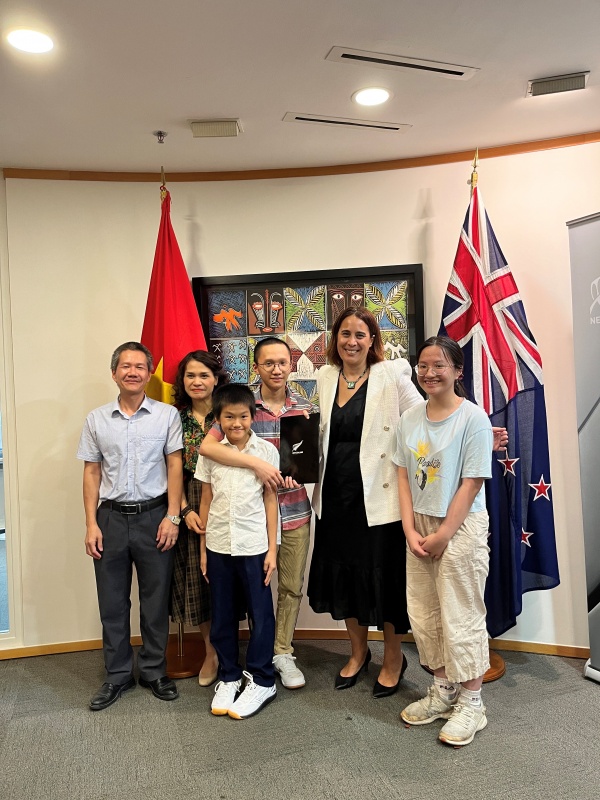
Nguyen Huy could not make it for the in-person Awards Ceremony in HCMC, so we arranged a special meet-up for his family at the Embassy in Hanoi with Ambassador Tredene Dobson, who awarded him with the NZSS certificate.
ENZ’s Business Development Manager, Mary Camp said that the scholarship programme not only offers talented Vietnamese students the opportunity to experience our country’s world-class education but also brings new perspectives and ways of thinking to Kiwi students as they learn alongside international friends.
“Schools in Aotearoa New Zealand are excited to welcome these top scholars from Viet Nam. Previous scholarship winners have had great academic success, made valuable contributions to their schools in NZ, and have gone on to attend top quality universities in NZ and internationally” added Mary.
This year’s award winners were celebrated at a ceremony on 18 June in Ho Chi Minh City where H.E Tredene Dobson, New Zealand Ambassador to Viet Nam opened the awards ceremony and pre-departure briefing and congratulated all the students.
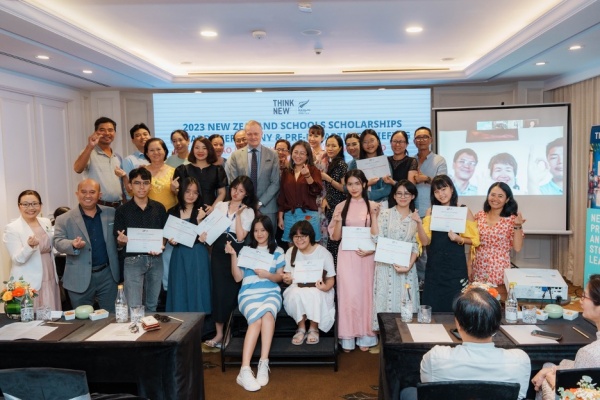
ENZ’s market manager Van Banh (far left) and Guy Lewis, Consular, NZ Embassy in Hanoi, with NZSS award recipients and family members at the awards ceremony and pre-departure briefing.
ENZ’s Regional Director for Asia, Mr Ben Burrowes also congratulated the students via video link and said it was fantastic to have a range of ex-scholarship winners and parents join us to share their tips and advice to this year’s winners.
“ENZ is absolutely committed to its relationship with Viet Nam and we are excited to welcome the NZSS recipients this year. The NZSS programme is designed so that more Vietnamese school students can access a world-class New Zealand education experience. As we saw pre-COVID, the NZSS recipients received the highest quality education and care while they were in New Zealand and that will certainly continue in 2023,” said Mr Burrowes.
A special thanks goes to the VSANZ - Vietnamese Students' Association in New Zealand for its President's presentation on the Pre-Departure Checklist and the NEW tips.
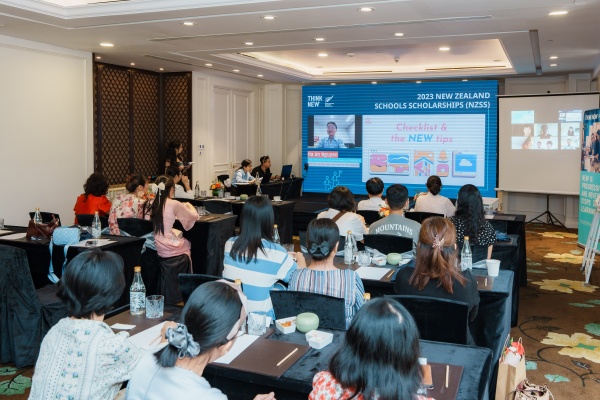
Ms Ha An Nguyen, President of VSANZ, shared useful tips for NZSS students to get well-prepared for the new learning journey in New Zealand.
We wish these students the absolute best for an exciting and rewarding study experience ahead as they start school across the country this week and in the coming months.
-
International students report high satisfaction as New Zealand sees steady recovery in enrolments
This year, 87 percent of students gave a positive rating of their overall experience, maintaining the upward trend seen in 2024 (86%). The proportion of students who rated their experience as ‘excellent’ rose to 43 percent, a two percent increase from the previous year.
These strong satisfaction results come as international student enrolments in New Zealand continue to grow. Between January and April 2025, 63,610 international students were enrolled with New Zealand education providers, a 16% increase compared to the same period in 2024 (54,690), and a 49% increase on 2023 (42,700).
All education subsectors saw growth, with Private Training Establishments (PTEs) showing the strongest increase at +41% compared to 2024.
China and India remained the top source markets, followed by Japan, South Korea, Sri Lanka, USA, Nepal, the Philippines, Thailand, and Germany. Notably, Sri Lanka rose to fifth place (from ninth), and Nepal to seventh (from eleventh), reflecting shifting dynamics in student mobility.
What students value most
Students were most positive about the people and connections they made in New Zealand (92%), the quality of their education (90%), their arrival and orientation experience (89%), the ease of making study arrangements (87%), and their overall living experience (87%).
International students’ experiences of making study arrangements have notably improved, with 80 percent of students rating their experience with the visa application process positively (up from 78% in 2024), and 74% positively rating the time taken to get their visa (up from 64%).
Education New Zealand and Immigration New Zealand will continue to collaborate on provision of information to students to ensure an enhanced student experience.
The survey also shows an increasing proportion of international students regard New Zealand as offering good value for money, with positive perceptions rising from 65% to 76%.
Education New Zealand's Chief Executive, Amanda Malu, said the results reflect New Zealand’s ability to provide a high-quality education within an environment that fosters meaningful connections and relationships.
“This is encouraging news for New Zealand. The fact that students continue to rate their experience here as excellent is a credit to our education providers and speaks to the warmth of the welcome our communities extend to international students,” she said.
“We’re seeing a steady and encouraging recovery in international education. It’s not a boom, but a sign that our collective efforts are making a difference. What matters most is that students are not just coming to New Zealand, they’re having a high-quality experience that supports wellbeing and a sense of belonging.”
“Under the International Education Going for Growth Plan, we’re focused on thoughtful, sustainable growth. These insights help us ensure that our progress is not just about numbers, but about delivering long-term value to students, communities, and the wider economy.”
Education New Zealand’s Director Insights and Performance, Marie Clark, said the survey continues to be a key piece of work for ENZ and a useful tool for the international education sector.
“It remains the only national survey focused on international student experience in all subsectors in New Zealand. With several years of data now collected, we’re building a meaningful picture of student experience over time,” she said.
“The ability to break down insights by variables like country, sector, and gender makes the dataset especially useful. We expect the report and Tableau dashboards will be very practical resources for anyone working in the sector,” Clark added.
For further information:
- Visit Tableau Public to access the data sets: International Student Experience Survey 2025 | Tableau Public
- Sai Raje | Senior Communications Advisor, Education New Zealand Manapou ki te Ao
sai.raje@enz.govt.nz | +64 21 479 649
Notes to Editors:
About the New Zealand International Student Experience Survey 2025
The survey aims to better understand the overall experience of international students enrolled with New Zealand education providers, as well as recent graduates. It also identifies areas for improvement to enhance the student journey.
Fieldwork was conducted from 28 April to 19 May 2025 with 5,420 respondents across all education subsectors and stages of study.
About Education New Zealand Manapou ki te Ao
Education New Zealand Manapou ki te Ao (ENZ) is the government agency dedicated to helping New Zealand realise the social, cultural, and economic benefits of international education. Our role is to promote New Zealand as a high-quality education destination offering excellent education and student experiences.
With approximately 85 staff in 13 locations around the world, ENZ works closely with New Zealand’s diverse education sector which includes schools, English language providers, Private Training Establishments, Institutes of Technology and Polytechnics (New Zealand Institute of Skills and Technology Te Pūkenga), and universities.
Internationally, we work with a range of education stakeholders, including government agencies and education providers to identify and encourage sustainable growth opportunities for New Zealand’s education sector.
-
Market insights from Saudi Arabia
The most notable changes have included restrictions to the Saudi scholarships programme, and a renewed focus on increasing the provision of private education to meet future growth in demand. As a result, opportunities ahead will be found in in-country education provision, while changes to the scholarship programme provide an opportunity to position New Zealand well for favoured specialist disciplines.
Saudi Arabia is a ‘promote’ market for Education New Zealand. In 2014, 3,246 Saudi students enrolled with New Zealand providers. Saudi students often progress through English language, foundation courses, bachelor degrees and postgraduate qualifications here. Many New Zealand organisations also offer education services in-market.
Scholarships changes
Saudi Arabia has implemented the largest study-abroad scholarship programme in the world, with up to 180,000 Saudi students being sponsored at any one time.
Students have traditionally entered the scholarship programme either by undertaking three to four months privately funded English language study and then receiving a scholarship from the in-country Cultural Mission (the private-entry pathway), or by receiving a full scholarship in Saudi Arabia (the Saudi-entry pathway).
-
Private entry pathway changes: In February the Saudi Government announced restrictions on the private entry pathway, which had accounted for the majority of scholarship students globally. This restriction requires students to attend a top-100 university (Shanghai JiaoTong rankings) before being admitted. This route had been paused since 2015 – a factor reflected in New Zealand’s first time student visa statistics, which show a reduction in first-time student numbers from March 2015 onwards (brown versus blue line below).

-
Saudi pathway changes: The Ministry has also reformed the Saudi pathway in 2015 by establishing 'your job your scholarship' which links the scholarships to future employment. The timeframes for this scholarship allocation process has been extended to provide for the central management of scholarships by the Ministry of Education (which merged with the Ministry of Higher Education in 2015).
In sum these changes will increase the entry criteria for the scholarships and therefore the overall calibre of Saudi scholarship students, and position New Zealand well for specialist disciplines that are in-demand in the Saudi labour market.
Increasing international and private education within the Kingdom
The recently appointed Minister of Education, Mohammed Al-Isa, has signalled that the Ministry is to review a long-standing ban on foreign universities. The Minister has also signalled in Arabic media that ‘private education will drive growth in the education sector’.
These signals may see growth in the number of private international operators established in the Kingdom. There will also be increasing opportunities for New Zealand providers to meet in-market demand for high quality education provision. Reflecting the importance that the Saudi authorities are placing on international investment, the theme of the April 2016 Ta’leem Exhibition, sponsored by the Ministry of Education, is ‘Investment in Education’.
Education New Zealand’s activities in Saudi Arabia in 2016 include a three-pronged approach to these changing market dynamics:
-
Targeting promotions towards private students, e.g. through the English-language promotional campaign which will focus on students studying abroad over the extended Saudi summer
-
Working directly with the Ministry of Education in Saudi Arabia, Saudi Arabia Cultural Mission in New Zealand, and sponsor agencies to offer places through the ‘your job your scholarship’ programme, and
-
Supporting New Zealand education organisations to increase the delivery of education services in Kingdom, as the Government tilts its investment towards more ‘in-market’ education solutions and delivery.
For further information, please get in touch with your key ENZ contact.
-
-
Around the world in five
Australia
From 1 July 2024, holders of a Visitor Visa in Australia will not be able to apply for a Student Visa onshore, in new rules announced by the Minister for Home Affairs, the Hon Claire O’Neil MP. Temporary Graduate Visa holders will also no longer be able to apply for Student Visas onshore. According to the Minister, these changes are aimed at restricting visa hopping, “ending the loopholes that allow student and other temporary visa holders to continuously extend their stay in Australia”.
Europe
The European Council, composed of national ministers from each EU country, has accepted a recommendation from the European Commission (which proposes and implements policies for the EU), to increase opportunities for European youth to learn, train, and study in other parts of Europe as well as in non-EU countries.
Japan
The annual survey of The Japan Association of Overseas Studies (JAOS) was released in May, providing a baseline indicator of outbound mobility from Japan based on responses from a sample of 40 JAOS member-agencies. Top line results show that outbound student numbers have now recovered to 83% of pre-Covid levels however destination choices continue to shift for Japanese students, and more are choosing to study within Asia.
Latin America
Latin America has become a region of high interest as colleges and universities worldwide seek to diversify their international student population, steering away from the traditional recruitment markets such as Southeast Asia.
South Africa
After pandemic-induced turbulence in South Africa’s English Language Teaching sector, which saw a decline in memberships, school closures, and more, the country is witnessing a significant market recovery post-Covid.

